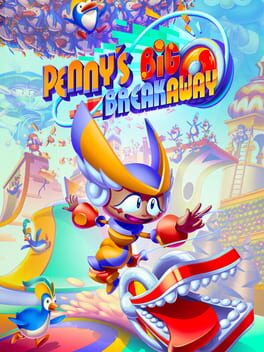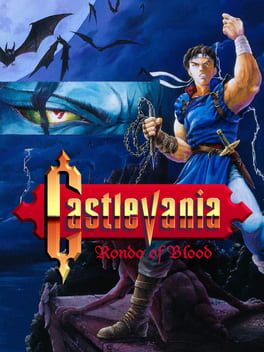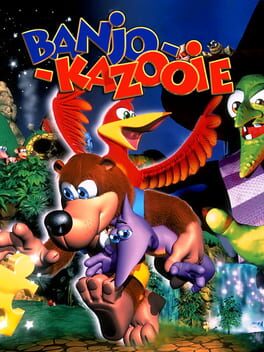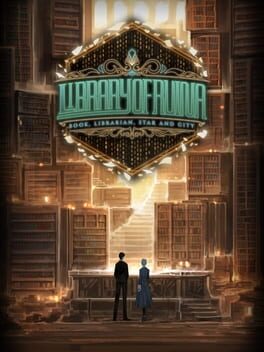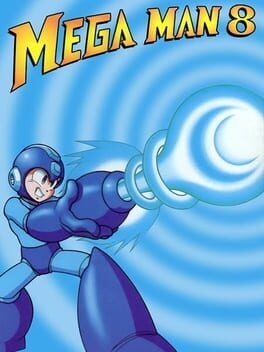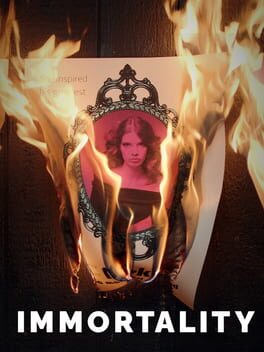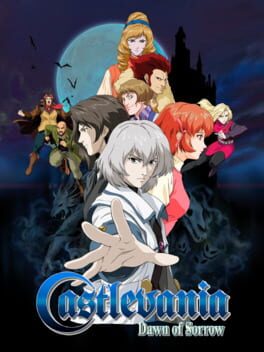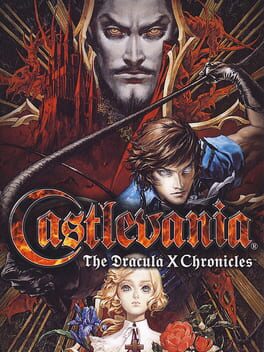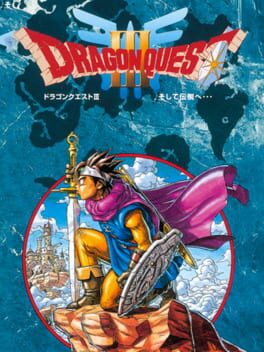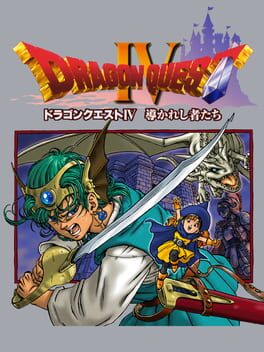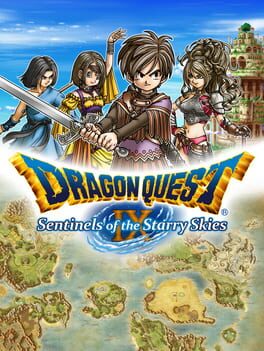Bekenshi
103 reviews liked by Bekenshi
Finished my third playthrough with the same smile on my face when I first discovered Rondo years ago. I replay this game and Symphony every Halloween and at this point the holiday (bad as it is in rural Ireland) is just an excuse to look forward to Richter backflipping through enemies. It's not my favorite (Symphony) nor what I would consider the most holistically designed castlevania (1986) but is the funniest, the happiest and satisfying game in the series.
I don't think I've played any other platformer with such a jovial spirit. This game is funny and makes me laugh out loud in ways most games never have. Death's blank stare when you destroy his scythe. The "oohs" that the zombies make in Stage 2. Triggering the trap in Stage 4 to send swarms of fleamen towards you only for most of them to jump to their deaths into spikes. Even deaths and game overs are deflated by how hilarious the contexts they are placed in. And the cutscenes. I love Richter's hearthy laugh when Annette insists on joining him in defeating Dracula. Or Annette's rant against Dracula. Castlevania has always drawn from the camp inherent in old horror stories however Rondo of Blood is the first title to really embrace and have fun with that mythos. It's a game that constantly asks you to laugh alongside it without the slightest degree of irony or cynicism when you fight an undead ninja farmer.
Every stage is a carnival, each procession of enemies and obstacles acting in tandem pushing and pulling with Richter to the beat of the dance tunes. Yet Rondo is more looser and playful in its adherence to the Classicvania gauntlet. Whereas prior games contextualise stages as avenues for action, Rondo of Blood imagines its stages as places and asks players to do the same to access its hidden content.
How Rondo of Blood treats hidden content ties with Super Mario World for ny favorite implement of secrets in a platformer. Now, 'secrets' in platformers have been codified into a formula established by Yoshi's Island and, ironically enough, Symphony of the Night. Moving into suspicious looking level geometry to make your completion number go up rather than genuinely novel discoveries that change how you engage with the game. Every secret in Rondo of Blood is contextualised uniquely within its stage. Figuring out that the spiked balls can be severed from their chains and then experimenting with that to destroy parts of the lower level geometry is more a interesting and satisfying discovery process than anything in subsequent igavania.
That you are rewarded with completely original stages and a whole new playable character with her own cutscenes and flavor is the cherry on top. It makes every new playthrough Rondo completely personalised and different and different from the last. It might be the mist replayable Castlevania in that regard outside of Aria of Sorrow. It certainly shares that game's spirit of generosity.
There are many other wonderful things that I could write about Rondo of Blood. Richter's movement and the enemy design alone could command pages worth of content. Honestly the Rondo of Blood official guide artwork better summises the ethos of this game that I love about it so much. Until next Halloween.
I don't think I've played any other platformer with such a jovial spirit. This game is funny and makes me laugh out loud in ways most games never have. Death's blank stare when you destroy his scythe. The "oohs" that the zombies make in Stage 2. Triggering the trap in Stage 4 to send swarms of fleamen towards you only for most of them to jump to their deaths into spikes. Even deaths and game overs are deflated by how hilarious the contexts they are placed in. And the cutscenes. I love Richter's hearthy laugh when Annette insists on joining him in defeating Dracula. Or Annette's rant against Dracula. Castlevania has always drawn from the camp inherent in old horror stories however Rondo of Blood is the first title to really embrace and have fun with that mythos. It's a game that constantly asks you to laugh alongside it without the slightest degree of irony or cynicism when you fight an undead ninja farmer.
Every stage is a carnival, each procession of enemies and obstacles acting in tandem pushing and pulling with Richter to the beat of the dance tunes. Yet Rondo is more looser and playful in its adherence to the Classicvania gauntlet. Whereas prior games contextualise stages as avenues for action, Rondo of Blood imagines its stages as places and asks players to do the same to access its hidden content.
How Rondo of Blood treats hidden content ties with Super Mario World for ny favorite implement of secrets in a platformer. Now, 'secrets' in platformers have been codified into a formula established by Yoshi's Island and, ironically enough, Symphony of the Night. Moving into suspicious looking level geometry to make your completion number go up rather than genuinely novel discoveries that change how you engage with the game. Every secret in Rondo of Blood is contextualised uniquely within its stage. Figuring out that the spiked balls can be severed from their chains and then experimenting with that to destroy parts of the lower level geometry is more a interesting and satisfying discovery process than anything in subsequent igavania.
That you are rewarded with completely original stages and a whole new playable character with her own cutscenes and flavor is the cherry on top. It makes every new playthrough Rondo completely personalised and different and different from the last. It might be the mist replayable Castlevania in that regard outside of Aria of Sorrow. It certainly shares that game's spirit of generosity.
There are many other wonderful things that I could write about Rondo of Blood. Richter's movement and the enemy design alone could command pages worth of content. Honestly the Rondo of Blood official guide artwork better summises the ethos of this game that I love about it so much. Until next Halloween.
Handler Walter: "Got a job for you 621. This is a rather personal request, from a friend of mine. It concerns a certain facility—a Watchpoint. Once, it regulated the underground flow of Coral. Now it serves to monitor the dormant veins. I want you to attack it. Your objective will be to destroy the sensor valve at its core. The Watchpoint is kept secure by SG, the planetside PCA force... which means it's too hot for the corporations to be seen there. In other words, we're flying strictly solo on this one."
Me: "STFU Walter nobody cares. Annoying ass Overseer member."
Ayre: "Raven...you have a new message."
Me: "Thank you for this vital information my queen. All hail Ayre of Rubicon!!"
Me: "STFU Walter nobody cares. Annoying ass Overseer member."
Ayre: "Raven...you have a new message."
Me: "Thank you for this vital information my queen. All hail Ayre of Rubicon!!"
Banjo-Kazooie
1998
Looking back on the games I played over the course of my childhood, I've noticed that some of my most memorable gaming expirences came from Rare. Before I discovered Banjo-Kazooie, I played and beat the GBA port of Donkey Kong Country 2 and the DS remake of Diddy Kong Racing, but out of those two games I found Diddy Kong Racing DS to be much more interesting. I frequently looked up information online on how to unlock everything that the game had to offer. Apon doing so, I eventually discovered that there was a whole other version of the game that came before it with a few characters that weren't in the DS version. This is how I discovered the existence of Banjo. It wasn't until I connected my Xbox 360 to the internet for the first time a few years later that I would rediscover Banjo-Kazooie and download the demos of this game and its sequel Tooie. Not long after, I was able to purchase both of them and enjoy them to my heart's content. The Banjo-Kazooie games quickly became some of my all-time favorites, leading me into developing a fascination for the developers that made them. I've even attempted speedrunning this game on the 360 version multiple times with my best time being around 5 hours. Having just finished another playthrough of this masterpiece, I will say this is easily Rare's best collect-a-thon and one of the best 3d platformers ever made.
There are a lot of positive things to say about Banjo-Kazooie. The graphics are nice, the characters are funny & memorable, the worlds are enjoyable to explore, and the size of said worlds are just right. One big issue with some of the games that came after this one such as Donkey Kong 64 & Banjo-Tooie are that the worlds are just too damn big and require a lot of backtracking. WIth Banjo-Kazooie, all the objectives & goodies are scattered throughout the levels in a way that isn't intrusive. The only exception being one jiggy you'll have to backtrack for in the middle part of the game, but unless you're aiming for 100% completion it is totally optional.
As far as negatives go, the controls can be a little confusing. It could be since my last playthrough was a couple years ago, but I had some trouble remembering the imputs for a few moves or just accidently doing the wrong thing. It was never something I thought about until I played this version but that's probably because of the obtuse design of the controller. The other issue is something that the 360 version fixes which involves having to recollect the Jinjos and musical notes if you died. It can be very aggrivating to go through the process of getting them all again, especially if you die in any of the later worlds. However, the reason this issue exists is because of hardware limitations so its somewhat excusable.
Banjo-Kazooie is Rare's most iconic IP and rightfully so. Its tight level design, beautiful worlds, and memorable cast cement this game as the best 3d platformer on the N64. Between Banjo-Kazooie & Mario 64, I'd say the bear & bird duo gave the Italian plumber a run for his money.
There are a lot of positive things to say about Banjo-Kazooie. The graphics are nice, the characters are funny & memorable, the worlds are enjoyable to explore, and the size of said worlds are just right. One big issue with some of the games that came after this one such as Donkey Kong 64 & Banjo-Tooie are that the worlds are just too damn big and require a lot of backtracking. WIth Banjo-Kazooie, all the objectives & goodies are scattered throughout the levels in a way that isn't intrusive. The only exception being one jiggy you'll have to backtrack for in the middle part of the game, but unless you're aiming for 100% completion it is totally optional.
As far as negatives go, the controls can be a little confusing. It could be since my last playthrough was a couple years ago, but I had some trouble remembering the imputs for a few moves or just accidently doing the wrong thing. It was never something I thought about until I played this version but that's probably because of the obtuse design of the controller. The other issue is something that the 360 version fixes which involves having to recollect the Jinjos and musical notes if you died. It can be very aggrivating to go through the process of getting them all again, especially if you die in any of the later worlds. However, the reason this issue exists is because of hardware limitations so its somewhat excusable.
Banjo-Kazooie is Rare's most iconic IP and rightfully so. Its tight level design, beautiful worlds, and memorable cast cement this game as the best 3d platformer on the N64. Between Banjo-Kazooie & Mario 64, I'd say the bear & bird duo gave the Italian plumber a run for his money.
After a succession of 9 games in the Castlevania series (yes, for some reason Konami counted Vampire Killer and Haunted Castle), each game making variations to the original formula in its own way, comes Castlevania X: Rondo of Blood, which is a return to the basic gameplay and also serves as a sort of tribute to all the Castlevania games up to that point, a game that came to the PC Engine exclusively for Japan in 1993.
I'll start by talking about what makes this game so satisfying to play, and that is that everything is super polished, calibrated and refined in every aspect, from tiny things like the speed at which Richter and the enemies move (which is a bit faster than past installments), to things like a very well constructed level design. All Castlevania games up to this point have always had parts that are designed to make you fail or trip you up the first time, often feeling unfair, however, in this game even though a bit of trial and error is required, every challenge from the levels themselves to the bosses feel like a perfectly balanced obstacle to be challenging, yet fair, to the point that it's easy to get hooked on this game as each attempt can lead to discovering the rest of the stage until you finally get to beat it.
Rondo of Blood simplifies many aspects of the gameplay, as there is less emphasis on the point system and the upgrades for the whip are completely eliminated in pursuit of having the whip at its maximum level from the beginning, not to mention that the limiter on the number of times you can use a sub-weapon no longer exists and now you can throw them as many times as you want (as long as you have enough hearts). And thanks to that the sub-weapons actually have a more prominent role in this game, as they were slightly re-balanced in terms of behavior, not to mention that when you pick one up, you can go back to the previous one in case you did it by mistake, making the game allow you to carry your favorites always and allow you to plan better strategies for the levels in some cases. Also, Richter can perform a "super-attack" with each of the sub-weapons, which despite consuming a lot of hearts, can save you on more than one occasion and is a pretty cool addition.
Still, there are small changes in the character control, which if you master well, can reward your skill. Richter can perform backflips if you press the button to jump at the right time while in the middle of a straight jump, and also be able to jump up stairs and jump when you're on them, as well as instantly jump down at any time. Also, while you can't redirect your jumps completely, you can redirect where Richter is looking, which makes it so you can jump backwards while flipping in the opposite direction to attack, and if you do a normal jump without moving backwards or forwards, you can slightly change the position you might fall into. I may have gone into too much detail when talking about this, but the way you move has always been a very important aspect, and it's partly these little tweaks and additions that make the gameplay feel so good despite keeping the classic control scheme.
The aesthetic of this game is timeless and perfectly captures the 90s era in all its glory. Certainly the fact that at the time it was a Japanese-only release makes this section have more explicit religious references, and above all, it was what allowed it to have those anime-style cutscenes (which feature voice acting!), which even though I'm more a fan of the somber and mystical atmosphere that Castlevania IV was trying to build, I won't deny that these little pixel art cinematics inspired by the anime of the time also have their charm. Graphically it's not as impressive as the aforementioned SNES title or Castlevania for Shap X68000, however, the artistic style of this game ages better by having a more refined pixel art that wisely combines bright colors with dark colors to give life to the scenarios, and the enemies in this installment look so good, that many of these sprites could be used even more than 10 years later in the installments released for the DS. I almost forgot, but mention to the simplified interface of this game that re-designs the old one so that the score, vitality and what sub-weapons you have can be displayed in an elegant way while covering less screen space compared to the old interface.
One of the things I love most about this title is the variety of stages it has to offer. Thanks to the fact that this game hides a series of secret levels, it can allow itself the freedom of having the typical castle levels, but also levels in which even the weather of the day is sunny, and it is quite entertaining to explore these levels to find the secret exits.
And finally, one of the best aspects of this game is undoubtedly its soundtrack, which thanks to the fact that the game is in CD format, has an extremely high fidelity and does not compare to anything of the time, just listen to this (Bloody Tears). This game has a lot of good remixes of songs from previous games, but it also has many new songs like Illusionary Dance, which is the melody that sounds when you face Dracula and instantly became an icon of the franchise, or my favorite;Opposing Bloodlines, the Richter's main theme and a piece that captures very well the essence of this game; classic enough to not clash with the setting, but at the same time modern, lively and even a little heroic.
Conclusion
And well, needless to say, this game is really solid and I dare say one of the best platformers of the 90s. Rondo of Blood doesn't innovate in gameplay, as it goes back to the basic gameplay as I mentioned before, however it perfects it to such a level that it is considered by many (including me) as the pinnacle of the classic Castlevania games.
And well, I'm glad to have finally reviewed this game, although for the moment I think this will be the last time I'll play it again, because I've already played it so many times, that if I did it once more, I would prefer it to be in its PSP remake, which I personally adore and consider it as the definitive version of Rondo of Blood, but that's a review for another day...
Anyway, play this game if you want to experience a good classic Castlevania, whether it's your first time or your twentieth, rest assured you'll have a spectacular time.
I'll start by talking about what makes this game so satisfying to play, and that is that everything is super polished, calibrated and refined in every aspect, from tiny things like the speed at which Richter and the enemies move (which is a bit faster than past installments), to things like a very well constructed level design. All Castlevania games up to this point have always had parts that are designed to make you fail or trip you up the first time, often feeling unfair, however, in this game even though a bit of trial and error is required, every challenge from the levels themselves to the bosses feel like a perfectly balanced obstacle to be challenging, yet fair, to the point that it's easy to get hooked on this game as each attempt can lead to discovering the rest of the stage until you finally get to beat it.
Rondo of Blood simplifies many aspects of the gameplay, as there is less emphasis on the point system and the upgrades for the whip are completely eliminated in pursuit of having the whip at its maximum level from the beginning, not to mention that the limiter on the number of times you can use a sub-weapon no longer exists and now you can throw them as many times as you want (as long as you have enough hearts). And thanks to that the sub-weapons actually have a more prominent role in this game, as they were slightly re-balanced in terms of behavior, not to mention that when you pick one up, you can go back to the previous one in case you did it by mistake, making the game allow you to carry your favorites always and allow you to plan better strategies for the levels in some cases. Also, Richter can perform a "super-attack" with each of the sub-weapons, which despite consuming a lot of hearts, can save you on more than one occasion and is a pretty cool addition.
Still, there are small changes in the character control, which if you master well, can reward your skill. Richter can perform backflips if you press the button to jump at the right time while in the middle of a straight jump, and also be able to jump up stairs and jump when you're on them, as well as instantly jump down at any time. Also, while you can't redirect your jumps completely, you can redirect where Richter is looking, which makes it so you can jump backwards while flipping in the opposite direction to attack, and if you do a normal jump without moving backwards or forwards, you can slightly change the position you might fall into. I may have gone into too much detail when talking about this, but the way you move has always been a very important aspect, and it's partly these little tweaks and additions that make the gameplay feel so good despite keeping the classic control scheme.
The aesthetic of this game is timeless and perfectly captures the 90s era in all its glory. Certainly the fact that at the time it was a Japanese-only release makes this section have more explicit religious references, and above all, it was what allowed it to have those anime-style cutscenes (which feature voice acting!), which even though I'm more a fan of the somber and mystical atmosphere that Castlevania IV was trying to build, I won't deny that these little pixel art cinematics inspired by the anime of the time also have their charm. Graphically it's not as impressive as the aforementioned SNES title or Castlevania for Shap X68000, however, the artistic style of this game ages better by having a more refined pixel art that wisely combines bright colors with dark colors to give life to the scenarios, and the enemies in this installment look so good, that many of these sprites could be used even more than 10 years later in the installments released for the DS. I almost forgot, but mention to the simplified interface of this game that re-designs the old one so that the score, vitality and what sub-weapons you have can be displayed in an elegant way while covering less screen space compared to the old interface.
One of the things I love most about this title is the variety of stages it has to offer. Thanks to the fact that this game hides a series of secret levels, it can allow itself the freedom of having the typical castle levels, but also levels in which even the weather of the day is sunny, and it is quite entertaining to explore these levels to find the secret exits.
And finally, one of the best aspects of this game is undoubtedly its soundtrack, which thanks to the fact that the game is in CD format, has an extremely high fidelity and does not compare to anything of the time, just listen to this (Bloody Tears). This game has a lot of good remixes of songs from previous games, but it also has many new songs like Illusionary Dance, which is the melody that sounds when you face Dracula and instantly became an icon of the franchise, or my favorite;Opposing Bloodlines, the Richter's main theme and a piece that captures very well the essence of this game; classic enough to not clash with the setting, but at the same time modern, lively and even a little heroic.
Conclusion
And well, needless to say, this game is really solid and I dare say one of the best platformers of the 90s. Rondo of Blood doesn't innovate in gameplay, as it goes back to the basic gameplay as I mentioned before, however it perfects it to such a level that it is considered by many (including me) as the pinnacle of the classic Castlevania games.
And well, I'm glad to have finally reviewed this game, although for the moment I think this will be the last time I'll play it again, because I've already played it so many times, that if I did it once more, I would prefer it to be in its PSP remake, which I personally adore and consider it as the definitive version of Rondo of Blood, but that's a review for another day...
Anyway, play this game if you want to experience a good classic Castlevania, whether it's your first time or your twentieth, rest assured you'll have a spectacular time.
Library of Ruina
2021
Library of Ruina
2021
I think what generally strikes me first about Ruina, when reflecting, is scale and balance. Most of it comes from sheer awe, jumping from LobCorp this whole work has a stark amount of awareness of the ramifications of LobCorp, while also choosing to make an ambitious goal to balance so so so much more on top. And yet, the scales do not tip over, the further I mulled over and dived into things, the more everything seems awfully well set. Lot of flowery words to say that Project Moon has read a significant amount of literature between games and has an incredible amount more to say AND manages to integrate it perfectly, stretching my use of the word 'ludonarrative' to its absolute limit.
Ruina runs out the gate dismantling the 'hero' of the prior story, burning its idea of redemption into beautiful flame before trying to work beyond him. It keeps the hands of librarians that followed him, resolute in their ways, alongside villains seeking vengeance, joining together against the systems that have confined them, constructing a tower of babel built upon lives hoisted out of the city, justified in the name of 'fairness'. Watch along with them as the city moves in clockwork, these gears set by hypercapitalist systems that turn along people until they are crushed under the metal and spat out as ground together puppets. Reprieve only in the hopes of the little bits of light that people cling to to try to change, sometimes ending up with distorted selves trying desperately to conduct their own symphony, until all of us self realize, progressing beyond the means by which defines human, gender, creed into something more. Full Self-Actualization, Manifestation, capture your E.G.O. to build your future.
It's all explored in intense clashes! Use cards you pull from the light you take, then spread them out into tactics that run an intense ebb and flow on the battlefield. As you stack the shelves with every story you face and people you brutalize, the potential of your use of this knowledge flies sky-high, until you've made 'decks' that swallow the next set of fights with pinpoint precision. Even if you were a master deckbuilder you still have to adapt though. Solve the puzzle that matches each new patron's pscyhe, or be forced to retool from the pushed over house of cards. Every level jump in reputation brings in a whole area of complexity that gives you more immense freedom, with the caveat that the game pulls not a single punch for you to learn it. You'll be walled over and over until fundamentals are rock solid, pushed into an understanding of the ways of the city.
The leftover roots of the corporation that stand in ashes beneath the spine of the library throw you into even stronger, more complex puzzles, boss fights that adopt the abnormalities' story directly into turn by turn gameplay. Then reaching further, becoming thorough contextualization for the characters, then RE contextualizing across central theming. The Kabbalah's Sephirot and christian allegory returns with a much more complicated and personal base that transcends the story into touching on the baseline recognition of compassion and empathy, down to fighting anthromorphized struggles. Finish off by fighting demonic reflections of each lesson you've learned, until you're once again back at the base of the light, trying to look upon that all too familiar completely hopeless massive scope of depressing systems that oppress life, and going, This Can Change. Even those with the darkest masks over them can decide to break the cycle and seek to dismantle the machine. We can keep going while everything around us is 'distorted', and
Become Star of the City, Facing the Past, and Building the Future.
The journey's a long one but not one step is misplaced, not a moment wasted. You might have cause to grind to backfill your mistakes but the progression is always continuous. If you've got the head for it, you might even break it faster under your feet. The City is not without its weaknesses, after all!
But really, this is a rocketing experience, practically irreplaceable after much time to think over it. If you're not at least considering getting it what are you doing hereeee.
Ruina runs out the gate dismantling the 'hero' of the prior story, burning its idea of redemption into beautiful flame before trying to work beyond him. It keeps the hands of librarians that followed him, resolute in their ways, alongside villains seeking vengeance, joining together against the systems that have confined them, constructing a tower of babel built upon lives hoisted out of the city, justified in the name of 'fairness'. Watch along with them as the city moves in clockwork, these gears set by hypercapitalist systems that turn along people until they are crushed under the metal and spat out as ground together puppets. Reprieve only in the hopes of the little bits of light that people cling to to try to change, sometimes ending up with distorted selves trying desperately to conduct their own symphony, until all of us self realize, progressing beyond the means by which defines human, gender, creed into something more. Full Self-Actualization, Manifestation, capture your E.G.O. to build your future.
It's all explored in intense clashes! Use cards you pull from the light you take, then spread them out into tactics that run an intense ebb and flow on the battlefield. As you stack the shelves with every story you face and people you brutalize, the potential of your use of this knowledge flies sky-high, until you've made 'decks' that swallow the next set of fights with pinpoint precision. Even if you were a master deckbuilder you still have to adapt though. Solve the puzzle that matches each new patron's pscyhe, or be forced to retool from the pushed over house of cards. Every level jump in reputation brings in a whole area of complexity that gives you more immense freedom, with the caveat that the game pulls not a single punch for you to learn it. You'll be walled over and over until fundamentals are rock solid, pushed into an understanding of the ways of the city.
The leftover roots of the corporation that stand in ashes beneath the spine of the library throw you into even stronger, more complex puzzles, boss fights that adopt the abnormalities' story directly into turn by turn gameplay. Then reaching further, becoming thorough contextualization for the characters, then RE contextualizing across central theming. The Kabbalah's Sephirot and christian allegory returns with a much more complicated and personal base that transcends the story into touching on the baseline recognition of compassion and empathy, down to fighting anthromorphized struggles. Finish off by fighting demonic reflections of each lesson you've learned, until you're once again back at the base of the light, trying to look upon that all too familiar completely hopeless massive scope of depressing systems that oppress life, and going, This Can Change. Even those with the darkest masks over them can decide to break the cycle and seek to dismantle the machine. We can keep going while everything around us is 'distorted', and
Become Star of the City, Facing the Past, and Building the Future.
The journey's a long one but not one step is misplaced, not a moment wasted. You might have cause to grind to backfill your mistakes but the progression is always continuous. If you've got the head for it, you might even break it faster under your feet. The City is not without its weaknesses, after all!
But really, this is a rocketing experience, practically irreplaceable after much time to think over it. If you're not at least considering getting it what are you doing hereeee.
Final Fantasy XVI
2023
Mega Man 8
1996
Immortality
2022
This review contains spoilers
even though i had problems with this game i'm giving it 5 stars because MY LORD this is the most excited i've been about a project in a long time. finding new clips felt exhilarating and figuring out the plotlines of the films as they were entangled with the social drama of the in-universe cast and directors was so god damn fun. my issues arise with the end game: i got the credits roll when i felt like i was only halfway done with the game, and the search for the last 20-10% of clips felt impossible as all the new symbols i was discovering would only lead back to clips i already found. i'm on the fence about the "canon" answer this game provides with The One, i think this game could have worked much stronger as a grounded piece uncovering the cycle of power and abuse as all the men in marissa's life fail her from a young age. but even saying that, i was really moved by the Candy Says scene. i'm so glad i got to play this
